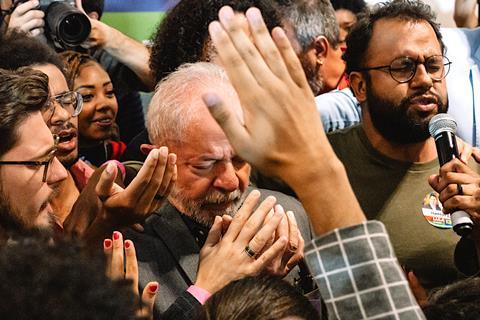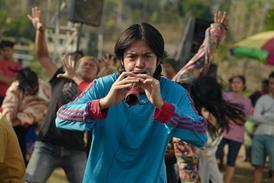Petra Costa follows The Edge Of Democracy with this look at the rise of religious populism in Brazilian politics

Dir: Petra Costa. Brazil/USA/Denmark. 2024. 110mins
The title might suggest a disaster epic or a war movie. In fact, Petra Costa’s documentary essay is a sobering account of the rise of evangelical populism in recent Brazilian politics – the ‘Apocalypse’ in question being that of the biblical Book Of Revelations, which Costa sees as a dangerous blueprint for a new breed of politically influential preachers.
An important study that is bound to attract politically curious audiences
Following her 2019 Academy-nominated doc The Edge Of Democracy, Costa here investigates a troubling political phenomenon that is very specifically rooted in Brazil’s history, but that has unmistakeable parallels with contemporary North American turmoil. Given a distinct personal edge by Costa’s own measured commentary, this is an important study that is bound to attract politically curious audiences following its premiere out of competition in Venice.
Overall the film covers several decades of modern Brazilian history, beginning with the creation of the nation’s federal capital city Brasilia in the 1950s, inspired, says Costa, by utopian dreams of democracy. But specifically, Costa addresses recent developments leading up to January 8 2023, when the supporters of far right president Jair Bolsonaro protested against his electoral defeat by storming the city’s Congress building. Divided into seven chapters – some with biblical titles – the film studies the rise in a strain of Brazilian evangelical Christianity which has insisted on direct involvement with national politics.
Much of the film focuses on one hugely influential pastor, the pugnacious Silas Malafaia. His charismatic presence and widespread media visibility led him to become a major factor in the election of Bolsonaro, and apparently the power behind the presidency. Malafaia, like many far-right figures, comes across as larger than life, even comic in his grandstanding and Costa uses that to good effect: there’s a delicious scene in the pastor’s car when Malafaia pretty much justifies his road rage as fulfilling Christ’s true spirit.
Costa’s account of South American history shows how poverty and dictatorships led to the rise of left-wing Catholicism motivated by Liberation Theology – bitterly opposed by the US, which painted it as a force of Communism. She attributes the new Brazilian evangelism – to which, apparently, 30% of Brazil’s population subscribes – to the US-backed influence of ideologically-charged evangelical forces, and figures such as preacher Billy Graham (seen here in archive footage). Yet Costa also presents a number of evangelicals who support Bolsonaro’s opponent and current socialist president Luíz Ignacio Lula de Silva. He is also interviewed, giving his own lucid explanation of just why reactionary evangelism might appeal to a disempowered electorate.
Confessing herself baffled by religious fervour, given her secular upbringing, Costa decides to do some Bible study, and is able to tease revealing ironies out of key passages of scripture. Especially telling is the opposition between the traditional idea of a compassionate, succouring Christ – represented here in a clip from Pasolini’s Gospel According To St Matthew – and the sword-wielding Messiah invoked by the likes of Malafaia, who sees himself as pursuing a sort of holy war.
Costa interweaves theological and worldly themes, the latter in interviews with politicians, pastors and working-class voters, while the religious elements are astutely underpinned by close-ups of paintings by Brueghel, Bosch et al. In a coda, musing over the wreckage caused by last year’s would-be insurrection in Brasilia, Costa points out that the Greek word ‘apocalypse’ actually means ‘revelation’, affording, she says, “a chance to open our eyes”. Her film definitely offers a chance to look more closely not just at the political condition of Brazil but, by extension, at the rise of far-right populism worldwide.
Production companies: Busca Vida Filmes, Peri Productions
International sales: Cinetic Media, Jason Ishikawa jason@cineticmedia.com
Producers: Petra Costa, Alessandra Orofino
Screenplay: Petra Costa, Alessandra Orofino
Cinematography: João Atala, Pedro Urano, Murilo Salazar, Ricardo Stuckert
Editors: David Barker, Victor Miaciro, Nels Bangerter, Jordana Berg, Tina Baz, Eduardo Gripa
Music: Rodrigo Leão
















